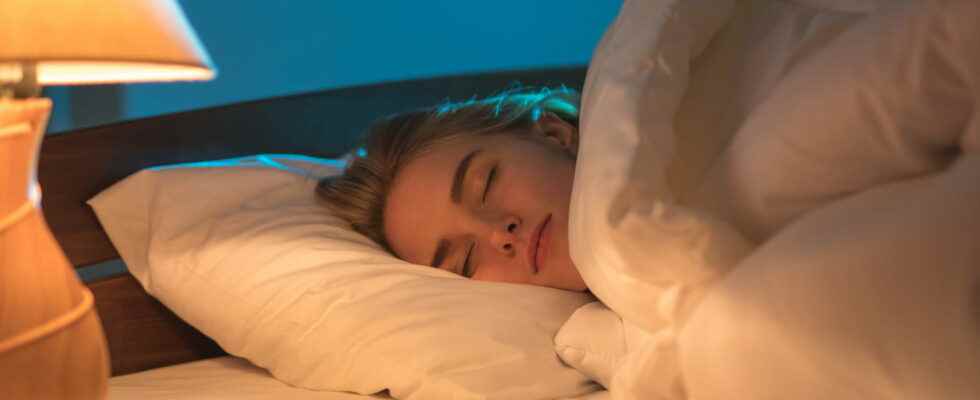Sleeping with the light on would increase the risk of heart disease and diabetes according to an American study published in the journal PNAS. Why ? Can it make you fat? What effects on sleep? Explanations.
Sleeping with the light on would increase the risk of developing heart disease or diabetes. according to a study published in the American scientific journal Proceedings of the National Academy of Sciences (PNAS) on March 14. The study involved 20 adults aged 18 to 40 separated into two groups: the first slept in the dark while the second slept in a dimly then brightly lit room. On the occasion of the International Sleep Day, which is held on March 18, this study demonstrates the effects of light exposure at night, especially during sleep, on cardiometabolic function. “To have a good sleep/wake balance, you need to have a good light/dark rhythm with very dark nights and the brightest possible days. Light plays a crucial role in the synchronization of the biological clock. At night, it influences and watches over everything that promotes sleep. recalls the National Institute of Sleep and Vigilance (INSV).
Why shouldn’t you sleep with the light on?
“Sleep with the light on increases heart rate during sleep, decreases its variability and increases insulin resistance the next morning compared to a night in a dimly lit environment” according to the authors of the American study. Insulin is the hormone that regulates blood sugar levels: “It is plausible that nocturnal exposure to light impairs glucose metabolism (regulation)“.
To protect yourself from light, you must:
|
|---|
Scientists also indicate that the presence of light during sleep suppress melatonin secretion. “Melatonin playing a role in the secretion and action of insulin, the suppression of melatonin would promote the incidence of diabetes” add the scientists. Finally, exposure to light during the night would have consequences on the activity of the autonomic nervous system. The latter has the role the functioning of the visceral organs (kidneys, digestive system, circulatory system…) and the regulation of all the functions the body’s automatic mechanisms such as respiration, circulation, digestion and elimination. “Exposure to light has a stimulating effect on the sympathetic autonomic systemas revealed increased cortisol or heart rate associated with exposure to light” according to the results of the study. If the light is not present at the “good time“it can have consequences on sleep.”a nocturnal exhibition [à la lumière] can interrupt or fragment sleep, at the risk of suffering from fatigue and being drowsy the next day. It can, if repeated, engender chronic sleep debt, even insomnia, and be associated with cognitive, metabolic and immune disorders” indicates the INSV. Other studies have shown the influence of artificial light or that of the full moon on sleep.
Does sleeping with the light on make you gain weight?
The results of the study published in the journal PNAS showed that a single night of exposure to ambient light during sleep can alter glucose homeostasis (regulation). “Any self-reported exposure to artificial light in the bedroom during sleep (small night light in the bedroom, light from outside the bedroom, or television/light in the bedroom) was associated with obesity in women“according to this study.”These results suggest that the light in the bedroom during nocturnal sleep can negatively influence metabolic regulation” conclude the scientists. Moreover, the results reveal that “higher levels of exposure to bedroom light were associated with higher incidence of type 2 diabetes in an older population“.
Sources:
– Exposure to light during sleep impairs cardiometabolic function, PNAS, March 14, 2022
– What environment for good sleep? National Institute of Sleep and Vigilance, March 22, 2013
